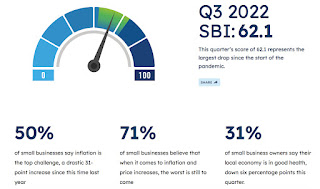The War on Small Business
Kurt Vonnegut once quipped that: "The two real political parties in America are the Winners and the Losers." With the Small Business Index at 62.1, the lowest since the pandemic, which itself was the lowest in a generation, small business owners are the losers. Given that small businesses create two-thirds of new jobs and deliver 43.5% of the United States GDP this is a BIG problem. But your elected leaders don't care. Why? Because small businesses do not have the clout to influence political change.
Case in point, why would a Veteran-owned small business like mine have to pay 50X (you read that correctly, FIFTY times) the Blue Shield healthcare premium as an illegal resident in California for the SAME healthcare plan? Answer: Because somebody has to pay the bills, and the proverbial "last man standing" is the small business owner. Freedom is expensive.
How did we get here? The war on small business has been brewing for decades, but finally the straw that broke the small business owner's back was healthcare. With the passage of the ACA on April Fool's Day 2010, pieces on the chess board started moving around rapidly. Political parties immediately started jockeying for pole position.
Since the majority of politicians never owned a small business, they were easy to influence. The labor unions got to work. Big corporations saw what was happening and they got to work too. Given that small businesses are by nature fragmented without a unifying central leadership they waited to see what happened next. Plus they were busy working trying to make a living. Bad move.
Labor Unions and Big Business effectively gamed the healthcare system so that union members and employees got cut rates on healthcare plans, and to make the deal more palatable, they also negotiated for universal care pools. But of course somebody had to pay unsubsidized premiums, and that of course would be based on income. Who better to sock it to than the silent small business owner?
Reaching out to my elected representative, Jimmy Panetta resulted in the terse reply that "healthcare is complicated." After a decade in place, it is not that complicated; depending on your income you pay different rates. Imagine if McDonald's worked that way! Your "Happy Meal" price would be a direct result of whether you worked for a union, a large company, or your immigration status! Preposterous.
Across the spectrum of wealth distribution, healthcare is the most onerous. But that is just the most glaring example. Inflation is the next one. It hurts the small business owner most, because he has to absorb more of the pricing increases and if he is to survive, passes along less of those increases. The 16% pay increase for rail workers or 10% pay increase to pilots won't decrease rail traffic or flight volume. In fact, the COST to ship freight or park a butt in a seat will simply be adjusted up, up, and away!
For the small business owner it is a death by a thousand cuts, with some "cuts" akin to a sucking chest wound. Like him or despise him, Joe Biden has done one thing really, really well...he has acted as a fine bellhop for the labor unions. When you print the money and sign the contracts to print more, inflation doesn't hurt much. Indeed, most union workers have never had it so good.
With Labor Unions the winners and small businesses the losers, what will the impact be on larger businesses? The cost of labor is typically the MOST expensive part of creating and delivering a product or service. As we can imagine then, large business are increasing prices and laying off employees (non-union of course, and many expendable H-1B visa holders at that) to cover the cost of inflation.
Net net when the wokescreen clears, this equation balances by the destruction of small businesses, many of which will cease to exist, go heavily into the black market, and/or rapidly innovate by embracing new technology and doing business differently (low odds on the latter.) At the end of Joe Biden's reign, fewer small businesses will remain, more unions will exist, and big business will be thriving (with far fewer employees.) Invest accordingly.
